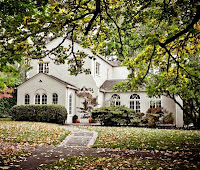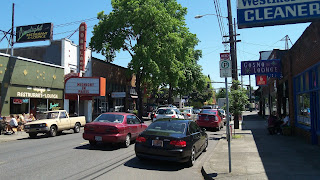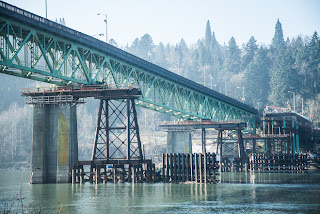 |
| Sellwood 100 years ago |
Driving further south, Sellwood homes range from the late 1800s to the 1950s, with build-ins and apartment buildings from the 1960s onwards, built on the grid. At it's birth in 1883, Sellwood developers hosted a free Willamette River ferry to shuttle potential home buyers from Portland to Umatilla (pron. you-ma-tilla) street. The neighborhoods running off Milwaukie Street, the main commercial band that runs through Sellwood, tend to have slightly larger lots, with more spacious mid-century developments. Parking can be tight in this area near the thoroughfares, but streets are well planted with trees and landscaping, and have a classically American, beautiful neighborhood look to them.
 |
| 1930's Spanish Colonial home in Eastmoreland |
The Moreland neighborhood homes near Reed College have larger lots, and more spacious, stately homes: mostly Bungalows, Tudors, Cape Cods/Colonials up to WWII, and ranches from mid-century, with more attention and care paid to yards.
Nearby Reed College can be said to be the Bennington of the West Coast, with a progressive tradition and an inventive course structure. Academics are at the heart of this college, which has no sports teams or fraternities which so often impact the campus environs and nearby homeowners. Of course, local renters are college students and employees.
 |
| Moreland with it's Art Deco movie theatre |
Since it's 'rediscovery' in the late 1990s, Sellwood/Westmoreland has a slightly more upscale and family-centered feel, clustered around independently and locally owned antique malls and shops, Mediterranean/Asian restaurants alongside upscale national chains one sees in trendy University towns, which are clustered along Milwaukie Street.
 |
| River front park in Sellwood |
 |
| Sellwood Bridge undergoing transformation |
Currently, the Brooklyn/Sellwood area is going through some growing pains, with elaborate road construction in the industrial areas, as well as the replacement of the Sellwood Bridge (which makes Beaverton and Lake Oswego easily accessible over the river). Local opinions can run high over taxes and traffic inconveniences, yet over the long term the changes appear to be for the good of these Portland neighborhoods.

No comments:
Post a Comment